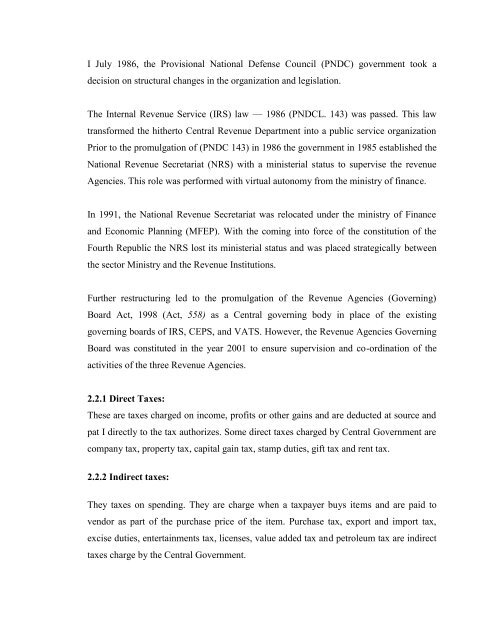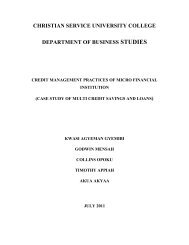TAX EVASION.pdf - Christian Service University College
TAX EVASION.pdf - Christian Service University College
TAX EVASION.pdf - Christian Service University College
Create successful ePaper yourself
Turn your PDF publications into a flip-book with our unique Google optimized e-Paper software.
I July 1986, the Provisional National Defense Council (PNDC) government took a<br />
decision on structural changes in the organization and legislation.<br />
The Internal Revenue <strong>Service</strong> (IRS) law — 1986 (PNDCL. 143) was passed. This law<br />
transformed the hitherto Central Revenue Department into a public service organization<br />
Prior to the promulgation of (PNDC 143) in 1986 the government in 1985 established the<br />
National Revenue Secretariat (NRS) with a ministerial s tatus to supervise the revenue<br />
Agencies. This role was performed with virtual autonomy from the ministry of finance.<br />
In 1991, the National Revenue Secretariat was relocated under the ministry of Finance<br />
and Economic Planning (MFEP). With the coming into force of the constitution of the<br />
Fourth Republic the NRS lost its ministerial status and was placed strategically between<br />
the sector Ministry and the Revenue Institutions.<br />
Further restructuring led to the promulgation of the Revenue Agencies (Governing)<br />
Board Act, 1998 (Act, 558) as a Central governing body in place of the existing<br />
governing boards of IRS, CEPS, and VATS. However, the Revenue Agencies Governing<br />
Board was constituted in the year 2001 to ensure supervision and co-ordination of the<br />
activities of the three Revenue Agencies.<br />
2.2.1 Direct Taxes:<br />
These are taxes charged on income, profits or other gains and are deducted at source and<br />
pat I directly to the tax authorizes. Some direct taxes charged by Central Government are<br />
company tax, property tax, capital gain tax, stamp duties, gift tax and rent tax.<br />
2.2.2 Indirect taxes:<br />
They taxes on spending. They are charge when a taxpayer buys items and are paid to<br />
vendor as part of the purchase price of the item. Purchase tax, export and import tax,<br />
excise duties, entertainments tax, licenses, value added tax and petroleum tax are indirect<br />
taxes charge by the Central Government.



